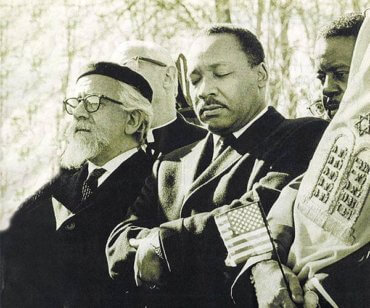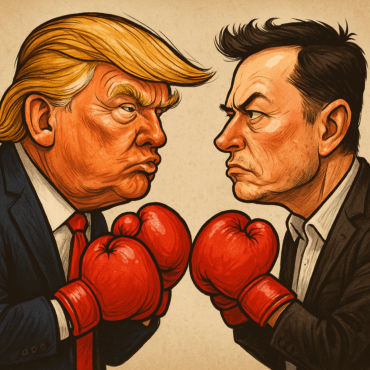What Does Judaism Believe About Politics and Government?
Dear Jew in the City-
Does Judaism have any opinions on politics or government? Are there Jewish Sources on how to deal with it and what our role should be?
Thank you,
Al
Dear Al –
Thanks for your question. Let’s first deal with our own form of government.
Some people mistakenly think that the Jewish people once were an anarchy. (“Anarchy” doesn’t mean “chaos,” it means “no government.”) They base this on the last verse in the book of Judges (21:25), “In those days there was no king in Israel; every man did what was right in his eyes.” There was not yet a king but that that doesn’t mean there was anarchy. There has always been government in Judaism, just not always the formal, centralized executive branch.
Let’s go back to the time of the Exodus. Moshe was the undisputed leader (at least until his position was disputed by Korach), the functional equivalent of a king and a judge. Running the whole show by himself was more than any human could handle, so his father-in-law, Yisro, suggested that he “seek out from among all the people capable men who fear God, trustworthy men who spurn ill-gotten gain. Set these men over them as heads of thousands, hundreds, fifties, and tens, and let them judge the people at all times. Have them bring every major dispute to you but let them decide every minor dispute themselves” (Exodus 18:21-22). This was the start of the local court system.
The Sanhedrin (“Supreme Court”) was actually a combination of the legislative and judicial branches. This was instituted in Numbers chapter 11, when God told Moshe, “Gather for Me seventy of Israel’s elders, whom you know as elders and officers of the people, and bring them to the Tent of Meeting and let them take their place there with you. I will come down and speak with you there, and I will draw upon the spirit that is on you and put it upon them, They shall share the burden of the people with you, and you shall not bear it alone” (verses 16-17). Courts always had an odd number of judges – 3 in local courts and 23 in regional courts. The Sanhedrin had 71 members, based on the original Sanhedrin that comprised Moshe and the seventy elders.
All the Tribes and cities were commanded to maintain their own local courts in Deuteronomy 16:18 “You shall appoint judges and officers for your tribes, in all the settlements that Hashem your God is giving you, and they shall govern the people with justice.”
As noted, the Sanhedrin was a combination of judicial and legislative branches; the executive branch was left vacant in one sense but it was fulfilled in another sense. Before there were kings, the people were ruled by the Judges. The Judges were either great scholars (sometimes prophets) like Gidon and Devorah, or great military leaders like Avimelech and Yiftach (Jephthah). But while they could do certain things that a king might do, like lead the nation to battle, their powers were limited.
The Torah foretold (Deuteronomy 17) that the people would eventually want a king because all the other nations had one. Accordingly, the Torah restricts the monarch’s powers, such as by limiting the number of wives, horses or riches he could have, and by requiring him to write a sefer Torah (in addition to the one each person should optimally write for himself) and to carry it with him at all times.
Sure enough, several hundred years later, the people demanded a king (I Samuel chapter 8). The prophet Samuel warned them about how a king would tax them and conscript their children but they wanted one anyway, so God appointed Saul the first king of Israel. But the king did not have unlimited powers. Refer, for example, to the story of King Ahab in I Kings chapter 21. Ahab wanted the vineyard of Naboth, who wouldn’t sell it. Queen Jezebel framed Naboth for treason so that she could have him executed and seize the vineyard for her husband. All this was necessary because, while a king was empowered to seize property for purposes of eminent domain (such as to build a highway), they were not empowered to do so because they wanted it for themselves. The king had tremendous but not unlimited power.
Now, as far as dealing with the secular authorities of the countries in which we live, the Mishna in Avos has more than a few thoughts. (It must be noted that the relations between Jews and the Zoroastrian, Roman, pagan, Church or Muslim authorities under whom they lived throughout history were very different from what most of us know in 21st-century US, Canada, UK or Israel. So let’s keep that context in mind.)
Avos 1:10 tells us to “love work, hate authority and do not become overly familiar with the government.” The Bartinuro explains that one should avoid the government as opposed to using it as a means to acquire authority, which the mishna just told us to shun. The Rambam explains this mishna by citing the Talmud in Sanhedrin (103b) that when a person gains authority over his fellow man on Earth, he invariably does things that make him a sinner in the eyes of Heaven.
Avos 2:3 says that those who do become familiar with the government, because it’s necessary for communal needs, should “be careful with the government because they only befriend a person for their own needs. They appear to be friends when it is beneficial to them but they do not stand by a person in his time of distress.”
Cynical though all this may sound, Avos 3:2 advises us to “pray for the welfare of the government because if not for fear of the authorities, people would swallow one another alive.” So, yes, power may corrupt but we need someone to wield it because the alternative is worse.
Nowadays, most of us reading this live in democracies, in countries with civil rights for citizens of all religions (though there are some glaring exceptions). In such countries, we have a moral obligation to participate in our governments. At the very least, this means to vote but optimally it includes advocacy and even running for public office.
The prophet Jeremiah foretold of our exile to other lands following the destruction of the Temple. In the 29th chapter of the book that bears his name, he tells us in God’s Name to “build houses for yourselves and dwell in them. Plant gardens and eat their fruit. Get married, have children, and get them spouses so they can have children of their own. Grow in numbers rather than diminish there. Seek the peace of the city where I exile you and pray to God for it because in its peace will you have peace” (verses 5-7). So right off the bat, we should do what we can for our communities. The Torah also commands us to “pursue justice” (Deuteronomy 16:20), which is easier to do when we’re involved in the process.
Despite the fact that the Torah form of government involves both a monarchy and a theocracy, it also recognizes the value of democracy. The Talmud in Brachos (55a), when discussing the appointment of Betzalel in Exodus chapter 35, says that people may only ascend to leadership positions with the consent of those who are to be governed. Additionally, the Shulchan Aruch in Choshen Mishpat (163:1) discusses the concept of “majority rule” in community issue:
“Regarding any public matter about which there is no consensus, the heads of all tax-paying households shall meet and express their opinions, agreeing to follow the majority. If the minority refuse, the majority can obligate them, even through the secular courts….”
The importance of voting can be inferred from the Gemara in Shabbos (54b). There it tells us that if one is able to protest the misconduct of his community and declines to do so, he is considered responsible for resulting misdeeds. We are not entitled to just sit back and let events unfold around us; we have to speak out and be involved.
Modern authorities universally affirm the need to be involved by voting, which was a privilege denied people for millennia. For example, Rav Moshe Feinstein ztz”l wrote that we are all required to vote even when our voter turnout would seem to make no impact. The reason voting continues to be important in such a case is because people analyze voting habits. It should be seen that the Jewish community turns out to vote so that the candidates and elected officials will keep our community’s needs in mind.
In a famous incident, the Chazon Ish told a Jew who couldn’t afford to pay the poll tax that he should sell his tefillin in order to get the money that would enable him to vote. The reason for this surprising ruling, the Chazon Ish said, is that the man could easily borrow a pair of tefillin in order to fulfill the mitzvah but there was no other way he would be able to vote, which is also a mitzvah.
I presume that most of us live in countries where we don’t have to worry about such things as poll taxes. If so, we have both an obligation to vote and no excuse for not doing so. By every standard of measure, it’s literally a mitzvah for us to be involved.
Sincerely,
Rabbi Jack Abramowitz
JITC Educational Correspondent
If you found this content meaningful and want to help further our mission through our Keter, Makom, and Tikun branches, please consider becoming a Change Maker today.







